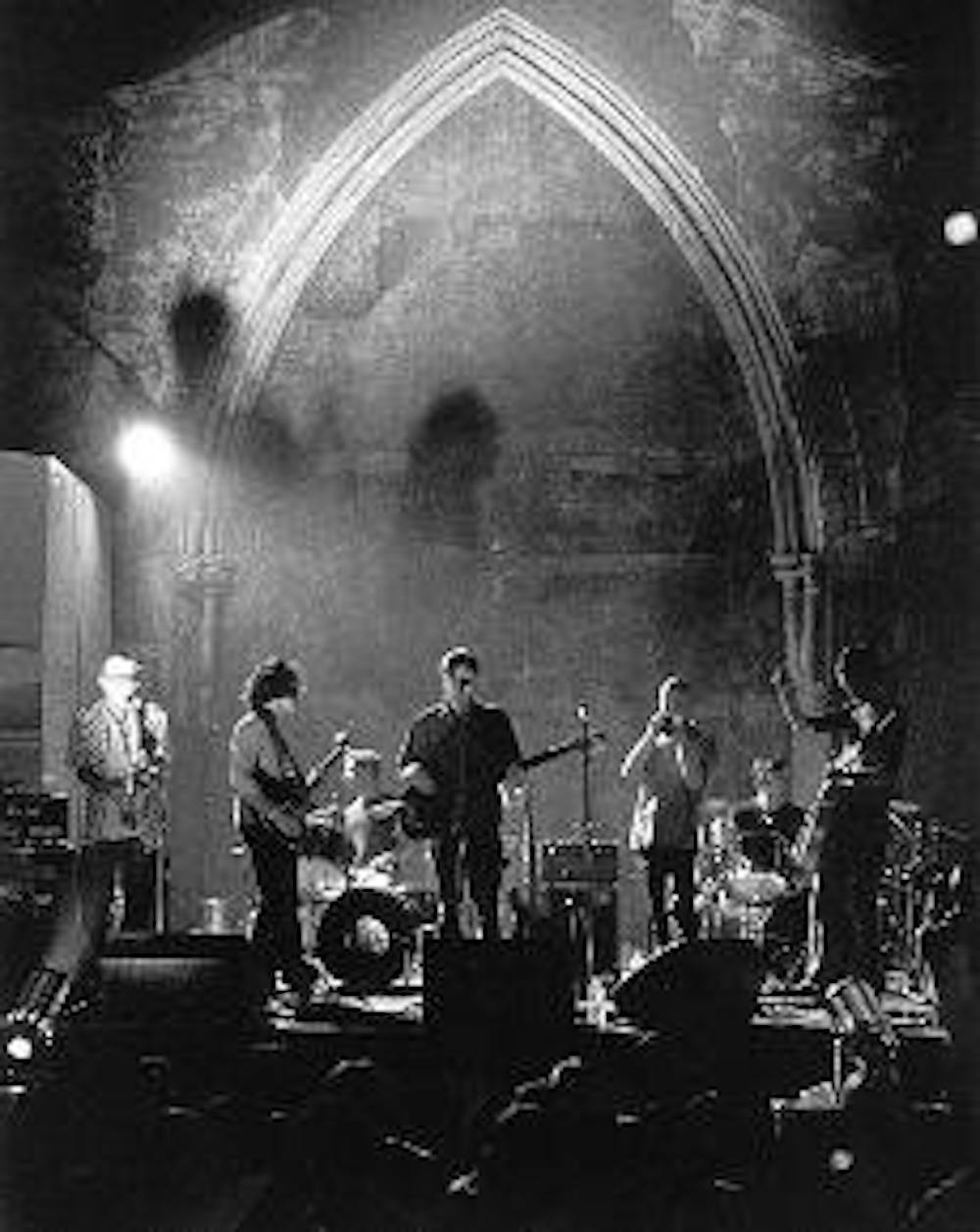Do Make Say Think needs no opener, as Sunday's concert proved, opening with only a few songs by the band's own producer. Brood, previously scheduled to play had canceled, but the Canadian band which killed his time slot prevailed.
Do Make Say Think is a special kind of band, in the way that it appears to be incredibly deceiving. In reality, it is one of the most cards-out-on-the-table bands in recent memory. To the cursory ear, Do Make Say Think appears quite unremarkable, as many of its songs are composed using deliberate, concise pronunciation that develops slowly into the song. It's very easy to hear the first two or three minutes of one of the band's songs, most of which are instrumental, with the perceived notion that you've heard the heart and soul of the composition.
In fact, a person could skip through an entire Do Make Say Think album listening to only a small fraction of each song and come to the conclusion that they are listening to a dull band without truly hearing a single note. This is because each individual note has a specific purpose within each composition, and can appear quite unremarkable out of context. What appears lackluster at first is actually the utmost in virtuosity with the most humble presentation.
To describe this virtuosity is quite difficult, as most examples of virtuosity don't contain a shred of modesty. As irony would have it, Do Make Say Think is usually grouped with a genre that is known for its intense pretension. But what else could honestly be expected from a name as inherently ridiculous as "post-rock?"
Really, the only common factor that Do Make Say Think share with bands like Explosions in the Sky and Mogwai is the fact that their music is both instrumental and dynamic. Do Make Say Think prove their exception to this genre that also suffers from rampant style aping by playing with a certain poise that evokes jazz as much as, if not more than, it does post rock. Do Make Say Think uses a loud-soft-loud style typical of post rock bands, but the finesse with which it controls these dynamics is very uncommon in any genre.
One can only truly appreciate this type of control by seeing these two drummers, two guitarists, bassist, violinist, synth player and full brass section all crunched onto the Black Cat's stage, playing as though they comprise a small orchestra rather than a rock band. It's almost amazing that they do not need to operate with a conductor, as their compositions involve abstract counterrhythms and many other elements that would royally screw any other musicians out of sync. Do Make Say Think does not suffer from such a problem, as its rhythm section consists of two drummers who act with a polyphonic cohesion that would appear to come from a programmed drum machine if each jazz-style brush tap wasn't so profoundly human. The end result is essentially the work of a four-armed drummer, effectively guiding the rest of the crew through every nuance of the band's epic songs.
The band opened with "Outer Inner & Secret," which features an absolutely epic bass line courtesy of Charles Spearin, who also plays in Broken Social Scene along with violinist Julie Penner. The first half of the set was comprised primarily of songs from Do Make Say Think's acclaimed 2003 LP "Winter Hymn Country Hymn Secret Hymn," including crowd favorite "Fredericia," which features a mind-numbingly groovy bass and drum interplay that crescendos to a triumphant climax complete with blaring horns and crashing cymbals. Another crowd favorite was "Ontario Plates," during which multi-instrumentalist Ohad Benchetrit plays a literate-sounding saxophone part over yet another expertly constructed drum amalgamation. The song has a fate similar to "Fredericia," with brass that sounds as if it is announcing the end of the world, or perhaps its beginning.
The second half of the set was mostly comprised of songs from the bands 2007 LP "You, You're a History in Rust." "The Universe!" trips up the audience by beginning with the triumphant voracity present in the climaxes of other Do Make Say Think songs and proceeds to follow a lead guitar that twists around a major scale with even more fascinating rhythms and horns to back it up. Somehow this song managed to be a continual climax and served as the climax for the concert as well, as the band waved and left the stage only to be ushered back by the persistent encore-craving claps of the audience.
The encore featured "Horns of a Rabbit," another 2003 favorite and one of the band's least orthodox. The crowd left satisfied since the band was able to squeeze in the best of the best, despite the lengthiness of most of their songs.
Do Make Say Think is an immensely talented group of musicians that plays and acts like nothing special, but don't be deceived. One is unlikely to ever find nearly as much significance in such few notes.





